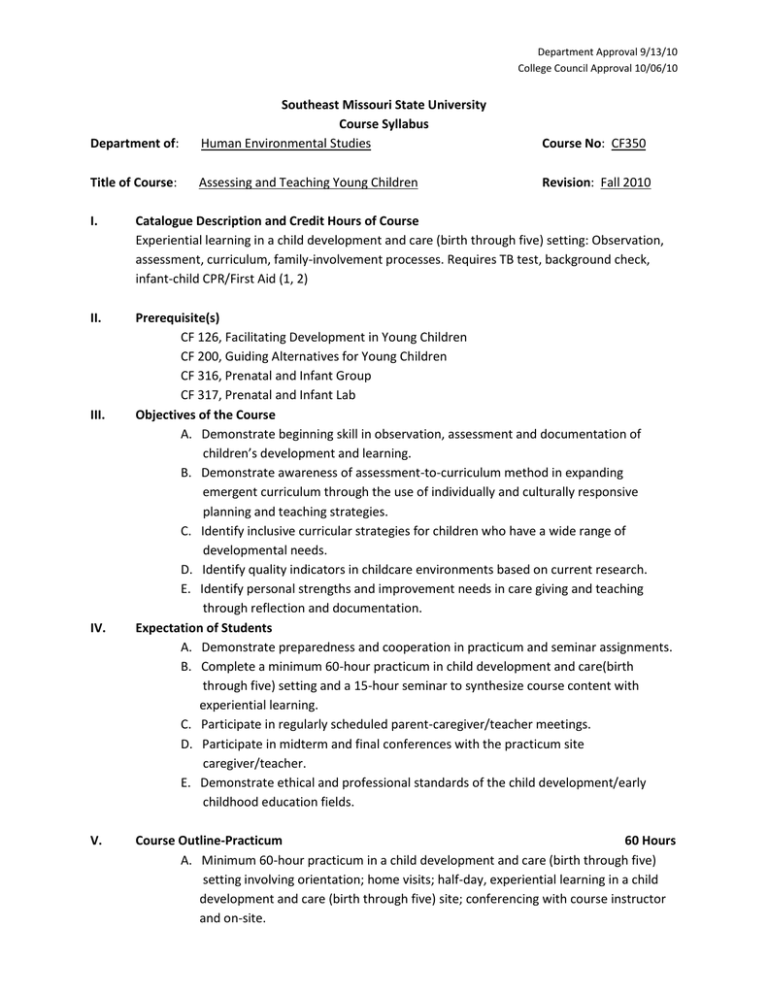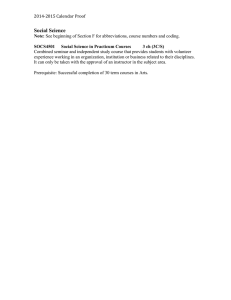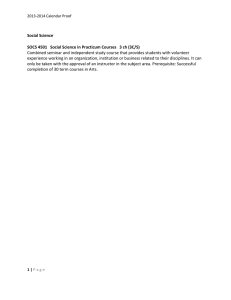
Department Approval 9/13/10
College Council Approval 10/06/10
Department of:
Southeast Missouri State University
Course Syllabus
Human Environmental Studies
Course No: CF350
Title of Course:
Assessing and Teaching Young Children
Revision: Fall 2010
I.
Catalogue Description and Credit Hours of Course
Experiential learning in a child development and care (birth through five) setting: Observation,
assessment, curriculum, family-involvement processes. Requires TB test, background check,
infant-child CPR/First Aid (1, 2)
II.
Prerequisite(s)
CF 126, Facilitating Development in Young Children
CF 200, Guiding Alternatives for Young Children
CF 316, Prenatal and Infant Group
CF 317, Prenatal and Infant Lab
Objectives of the Course
A. Demonstrate beginning skill in observation, assessment and documentation of
children’s development and learning.
B. Demonstrate awareness of assessment-to-curriculum method in expanding
emergent curriculum through the use of individually and culturally responsive
planning and teaching strategies.
C. Identify inclusive curricular strategies for children who have a wide range of
developmental needs.
D. Identify quality indicators in childcare environments based on current research.
E. Identify personal strengths and improvement needs in care giving and teaching
through reflection and documentation.
Expectation of Students
A. Demonstrate preparedness and cooperation in practicum and seminar assignments.
B. Complete a minimum 60-hour practicum in child development and care(birth
through five) setting and a 15-hour seminar to synthesize course content with
experiential learning.
C. Participate in regularly scheduled parent-caregiver/teacher meetings.
D. Participate in midterm and final conferences with the practicum site
caregiver/teacher.
E. Demonstrate ethical and professional standards of the child development/early
childhood education fields.
III.
IV.
V.
Course Outline-Practicum
60 Hours
A. Minimum 60-hour practicum in a child development and care (birth through five)
setting involving orientation; home visits; half-day, experiential learning in a child
development and care (birth through five) site; conferencing with course instructor
and on-site.
Course outline-Seminar
15 Hours
A. Orientation to child development and care settings: Role, responsibilities,
1 hour
peer engagement
B. Review of child development characteristics: Using typical development
baselines
1. Cognitive
2. Social/Emotional
3. Physical
2 hours
C. Ethics
1. NAEYC Code of Ethical Conduct and Statement of Commitment
2. Legal and culturally responsive ethical practice
1 hour
D. Assessment
1. Introduction to the ‘assessment-to-curriculum’ concept
2. Assessment strategies, tools, validity and reliability
3. Observation processes
4. Documentation techniques
5. Collection and organization of artifacts and data
6. Interpretation of data and unanswered questions
7. Communication of findings
8. The Child Portfolio: Using The Focused Portfolio method and forms
4 hours
E. Theory-to-Practice in inclusive child development and care settings
3 hours
1. Philosophy, theory and practice models- i.e. Constructivism, Reggio
Emilia, Project Approach
2. Review of child guidance techniques for all children
3. Curriculum design: State licensing, NAEYC guidelines, emergent
curriculum, and selected curriculum standards
4. Assessment and Teaching Plans: Guided observation, assessment
implementation and log, developmentally appropriate curriculum standards
and intellectual integrity
5. Design and adaptation of indoor and outdoor learning environments for all
Children
F. Child-teacher Interactions and Relationships
1. Consistency and trust
2. Flexibility
1 hour
G. Parent-Teacher Communication
1. Standards of professional written and oral communication
2. Conferencing: Practice in parent-caregiver/ teacher meetings
1 hour
H. Personal and Professional Development
1. Teacher reflection processes and methods
2 hours
a.
Journaling and critical self-analysis of practice with children,
families, and colleagues
b. Self-education methods-community resources, internet, colleagues
2. Opportunities for professional networking and training
3. Action plans: How to write a professional development plan
VI.
Textbooks
Purchase: Koestelnick, M.J., Soderman, A.K., & Whiren, A.P., (current edition). Developmentally
appropriate curriculum: Best practices in early childhood education. Upper Saddle River, NJ:
Pearson Prentice Hall.
Rental: McAfee, O. & Leong, D. (current edition). Assessing and guiding young children’s
development and learning. Boston, MA: Allyn & Bacon.
VII.
Basis for Student Evaluation
Exams
Practicum Assignments
Care giving/Teaching Performance Self-evaluation
Total
Grading Scale
90%-100%
80%-89%
70%-79%
60%-69%
below 58%
10%
60%
30%
100%
A
B
C
D
F
The weights of evaluation criteria may vary at the discretion of the course instructor.
VIII.
Academic Policy Statement
Students will be expected to abide by the University Policy for Academic Honesty regarding
plagiarism and academic honesty. Refer to: http://www6.semo.edu/judaffairs/code.html
IX.
Student with Disabilities Statement
If a student has a special need addressed by the Americans with Disabilities Act (ADA) and
requires materials in an alternative format, please notify the instructor at the beginning of the
course. Reasonable efforts will be made to accommodate special needs.



